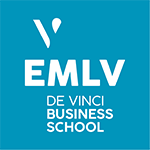
I am an Associate Professor of Digital Marketing at De Vinci Higher Education. I have previous experiences in teaching and research at the American University in Dubai (UAE) and University Laval in Quebec-Canada. With a Ph.D. and an MBA in Business Administration from the University of Quebec in Montreal, and an M.Sc. in finance, I have a background in digital marketing, financial services marketing, and relationship marketing. My research papers and interests focus on the adoption of innovations, consumer trust and value in the case of technology- mediated- transactions, e-service quality in the services industries, and on the impact of disintermediation and decentralization (Web3 and crypto-marketing) of economic transactions on consumers and organizations. I lead the M.Sc. in Marketing and Digital Communication at the EMLV of De Vinci Higher Education. Professeure- chercheure du marketing digital. Ma recherche se focalise sur les stratégies de la création de valeur, et de la confiance vis-à-vis des technologies du Web3 et la blockchain, caractérisées par la décentralisation, désintermédiation et par le P2P.
Tatiana ZALAN; Elissar Toufaily
A nascent market for digital assets: Exploration of consumer value of NFTs Article de journal
Dans: Digital Business, vol. 4, no. 2, p. 100084, 2024.
@article{zalan_3108,
title = {A nascent market for digital assets: Exploration of consumer value of NFTs},
author = {Tatiana ZALAN and Elissar Toufaily},
url = {https://www.sciencedirect.com/science/article/pii/S2666954424000127?via%3Dihub},
year = {2024},
date = {2024-12-01},
journal = {Digital Business},
volume = {4},
number = {2},
pages = {100084},
abstract = {Despite widespread academic and practitioner interest in non-fungible tokens (NFTs) as a form of digital assets, little is known about how consumers perceive NFT value. This exploratory research investigates why people create, trade or collect NFTs, what value they derive from them, and how online communities contribute to value co-creation. Over the course of two rounds, we interview 38 participants, most of whom are digital natives. We find that engaging with NFTs is the new form of day trading, reflecting financialization of everyday life. The value of NFTs is mainly speculative and utilitarian, and NFTs themselves are best thought of as derivatives. Value co-creation in NFT project communities is largely focused on gaining superior information about the project. We contribute to the crypto-marketing and web3 literature by advancing a novel model of NFT consumer value that extends Holbrook's (1999) typology and distinguishes both positive and negative aspects of consumer value that have been overlooked in mainstream literature. We shed light on the role of communities in an unusual setting: a nascent, illiquid, speculative, informationally opaque market for digital assets. Our study helps creators and brand managers to develop effective NFT strategies.},
keywords = {},
pubstate = {published},
tppubtype = {article}
}
Elissar Toufaily; Tatiana ZALAN
In blockchain we trust? Demystifying the ?trust? mechanism in blockchain ecosystems Article de journal
Dans: Technological Forecasting And Social Change, vol. 206, p. 123574, 2024.
@article{toufaily_3107,
title = {In blockchain we trust? Demystifying the ?trust? mechanism in blockchain ecosystems},
author = {Elissar Toufaily and Tatiana ZALAN},
url = {https://www.sciencedirect.com/science/article/pii/S0040162524003706?ref=pdf_download&fr=RR-2&rr=8a7436131c9600b9},
year = {2024},
date = {2024-09-01},
journal = {Technological Forecasting And Social Change},
volume = {206},
pages = {123574},
abstract = {The purpose of the paper is to conceptualize and redefine trust within the blockchain ecosystem by exploring the
trust construct across academic disciplines and its applicability in the blockchain context. We develop a conceptual
model and testable propositions that extend the work of McKnight et al. (2001, 2002, 2011) to the
blockchain ecosystem based on an integrative literature review. We conceptualize trust as a multidimensional,
multi-object construct combining three major objects of trust: algorithmic trust in the blockchain protocol
(platform), trust towards peers and services providers, and trust in decentralized applications (product). The
model reflects the process of building a trust layer for users and institutions on top of the trustless technology.
The paper demystifies the trust building process, from initial trust to knowledge-based trust, and its dimensions
within the blockchain ecosystem, and, consequently, helps practitioners to build strategies that increase users'
trust. The contribution to the academic literature resides in the unification of multiple perspectives on trust
within an integrative conceptual framework to point out the mechanisms of trust building process, as well as to
identify future research directions.},
keywords = {},
pubstate = {published},
tppubtype = {article}
}
Elissar Toufaily; Tatiana ZALAN
Ecosystem Well-Being and Resilience: Lessons from Crisis Management in Service Organizations Article de journal
Dans: Journal Of Business-To-Business Marketing, vol. 30, no. 4, p. 349-370, 2023.
@article{toufaily_2574,
title = {Ecosystem Well-Being and Resilience: Lessons from Crisis Management in Service Organizations},
author = {Elissar Toufaily and Tatiana ZALAN},
url = {https://www.tandfonline.com/eprint/BENMGRQVHA9IMWZQZV8K/full?target=10.1080/1051712X.2023.2289875},
year = {2023},
date = {2023-12-01},
journal = {Journal Of Business-To-Business Marketing},
volume = {30},
number = {4},
pages = {349-370},
abstract = {Purpose
In this paper, we investigate the strategies and approaches adopted by service organizations to navigate a humanitarian crisis and the lessons learnt from the crisis to face a future one. Understanding the effect of a crisis triggered by health pandemic hazards on services delivery and management, organizational strategies for survival and recovery, and the recovery post-crisis, in terms of building organizational and ecosystem resilience, is the focus of this paper.
Design/Methodology/Approach
Using a qualitative research design which closely approximates the theory-in-use (TIU) approach (Zeithaml et al. 2020), we interview 47 elite informants from service organizations that were particularly severely impacted by the crisis. We follow Corbin and Strauss's (2014) procedure for analysis of the interviews (i.e., open, axial and selective coding) and Saldaña (2013) for thematic analysis.
Findings
Drawing on Transformative Service Research (TSR) and dynamic capabilities perspective, we develop an empirical framework of crisis management which focuses on dynamic co-creation of service ecosystem well-being and resilience. Service organization responses included 1) retrenchment and balancing supply and demand, 2) service re-design and provision, 3) imposed service innovations, 4) digital servitization and 5) rethinking business models. Aiding with the process of crisis management in the face of uncertainty are dynamic capabilities, including strategic flexibility, market orientation, customer centricity, transformational leadership, and technological/digital capabilities.
Originality/Value/Contribution
The study provides a novel applied framework which sheds light on how organizations that co-created value with other firms, suppliers, customers, stakeholders (the focus of B2B marketing) fundamentally transformed their services to fulfill human and ecosystem actors' needs, by placing well-being right at the center of their crisis management strategies. We combine the TSR lens on service ecosystem well-being and resilience with the dynamic capabilities perspective to explore how service organizations managed the COVID-19 crisis and what lessons can be learnt to face any future crisis. We argue that well-being and resilience are dependent on a service co-creation process that involves multiple ecosystem stakeholders at the individual, organizational, community and societal levels. We have built on Anderson's et al. (2013) and Chen et al. (2020) work to explore empirically how well-being can be co-created in time of crisis. The process of value co-creation, through the responses identified in our paper (e.g., digital servitization and imposed innovations), were adopted to provide physical, health, financial and social safety to the service ecosystem actors (primarily customers, employees, and managers) during the pandemic.
Practical implications
The findings contribute to the service marketing practice by identifying the managerial strategies that blend TSR and dynamic capabilities. The study provides an applied framework which sheds light on how organizations fundamentally transform their services to fulfill human and ecosystem actors' needs, by placing well-being right at the center of their crisis management strategies. Well-being became a function of fulfilling the most basic human needs (belonging, safety, security and hygiene) of customers, employees, managers and communities. Our research helps managers and decision-makers to identify the right strategies and capabilities needed to manage a crisis. Critically, managers should stress building the skills of market orientation, digitalization and strategic flexibility to manage uncertainty. Service organizations require flexible and integrative decision-makers who elevate service innovation to a core strategic issue to come out from a crisis.},
keywords = {},
pubstate = {published},
tppubtype = {article}
}
Elissar Toufaily
An Integrative Model of Trust toward Crypto-Tokens Applications: A Customer Perspective Approach Article de journal
Dans: vol. 2, no. 2, p. 100041, 2022.
@article{toufaily_2802,
title = {An Integrative Model of Trust toward Crypto-Tokens Applications: A Customer Perspective Approach},
author = {Elissar Toufaily},
url = {https://www.sciencedirect.com/science/article/pii/S2666954422000217?via%3Dihub},
year = {2022},
date = {2022-09-01},
volume = {2},
number = {2},
pages = {100041},
abstract = {Trust is a key driver of consumers' acceptance and adoption of innovations. The purpose of the paper is to explore and understand the factors that facilitate the creation of trust in crypto-tokens decentralized applications (DApp) from the perspective of the consumer. A qualitative research design has been used and forty-five participants were interviewed for the study. Based on a theory-driven approach of qualitative data analysis, a multidimensional, holistic conceptual framework of trust has been proposed. The model captures the core categories that affect consumer's trust toward crypto-tokens applications. It highlights the need to understand the individual, technological, environmental and use-case features which shape the way blockchain-based applications can be trusted. The framework can be used by policymakers, educators, exchange platforms, DApp developers, and entrepreneurs to develop strategies that cultivate on the drivers of trust, and create value with crypto-tokens and Web3.0 economies. Higher trust ultimately promotes acceptance and adoption of blockchain applications.},
keywords = {},
pubstate = {published},
tppubtype = {article}
}
Florian Gerth; Vikash Ramiah; Elissar Toufaily; Glenn Muschert
Assessing the effectiveness of Covid-19 financial product innovations in supporting financially distressed firms and households in the UAE?, Article de journal
Dans: Journal of Financial Services Marketing, vol. 26, p. 215-225, 2021.
@article{gerth_2800,
title = {Assessing the effectiveness of Covid-19 financial product innovations in supporting financially distressed firms and households in the UAE?,},
author = {Florian Gerth and Vikash Ramiah and Elissar Toufaily and Glenn Muschert},
url = {https://doi.org/10.1057/s41264-021-00098-w},
year = {2021},
date = {2021-12-01},
journal = {Journal of Financial Services Marketing},
volume = {26},
pages = {215-225},
abstract = {Covid-19 has affected the global economy, influencing firm and household financial decisions worldwide. The Central Bank of the United Arab Emirates (CBUAE) released an AED 256 billion stimulus package to provide banks with sufficient capital to support economic activities and development by providing temporary relief to large corporations, small- and medium-sized enterprises, and households. New financial products have rapidly appeared, including relief packages for rent, mortgages, personal loans, credit cards, SMEs, and corporate entities. Regression analysis explores the effect of such relief packages on UAE firm and household finances. Using online survey data gathered via convenience sampling of UAE households, econometric analysis confirms that select demographic factors and financial instruments positively relate to effective financial decision-making. Our results guide policymakers on which relief packages effectively manage firm-level and household financial distress during a health pandemic.},
keywords = {},
pubstate = {published},
tppubtype = {article}
}
Elissar Toufaily; Tatiana ZALAN; Soumaya Ben Dhaou
A Framework of Blockchain Technology Adoption: An Investigation of Challenges and Expected Value Article de journal
Dans: Information & Management, vol. 58, no. 3, p. 103444, 2021.
@article{toufaily_2801,
title = {A Framework of Blockchain Technology Adoption: An Investigation of Challenges and Expected Value},
author = {Elissar Toufaily and Tatiana ZALAN and Soumaya Ben Dhaou},
url = {https://doi.org/10.1016/j.im.2021.103444},
year = {2021},
date = {2021-04-01},
journal = {Information & Management},
volume = {58},
number = {3},
pages = {103444},
abstract = {The purpose of the paper is to investigate the challenges and implications related to blockchain adoption in the private and public sectors, and from the entrepreneurs' perspective. Based on 46 semi-structured interviews, a data-driven conceptual framework is proposed focussing on the environmental, organizational and technological challenges of blockchain adoption. The framework includes expected socio-economic value of blockchain adoption at the ecosystem level from a multi-stakeholder perspective: organizations and industries, end-users and society, public sector, and start-ups and entrepreneurs. The paper highlights the differences between permissioned and permissionless blockchains and identifies new constructs in blockchain technology adoption.},
keywords = {},
pubstate = {published},
tppubtype = {article}
}
Elissar Toufaily; Tatiana ZALAN; Dennis Lee
What Do Learners Value in Online Education? An Emerging Market Perspective Article de journal
Dans: E-Journal of Business Education and Scholarship of Teaching, vol. 12, no. 2, p. 24-39, 2018.
@article{toufaily_2799,
title = {What Do Learners Value in Online Education? An Emerging Market Perspective},
author = {Elissar Toufaily and Tatiana ZALAN and Dennis Lee},
url = {https://www.learntechlib.org/p/191108/.},
year = {2018},
date = {2018-02-01},
journal = {E-Journal of Business Education and Scholarship of Teaching},
volume = {12},
number = {2},
pages = {24-39},
abstract = {The purpose of this paper is to explore the value of e-learning from a student's perspective and develops a dynamic model for evaluating e-learning perceived value in an emerging market context. A qualitative research design, via semi-structured interviews, was adopted with a group of respondents composed of undergraduate and postgraduate students who were enrolled in online, hybrid and face-to-face programs. Coding, categorization and thematic analysis of the interviews resulted in seven value dimensions, with their "Get" and "Give" components, of the dynamic learning experience. The study highlights the importance of each value dimension in relation to the stage of the learner experience, namely, prior to, during and after the delivery. Our research extends current e-learning perceived value research and frameworks. The paper provides guidelines for higher education institutions and policy makers on institutional change to support e-learning initiatives.},
keywords = {},
pubstate = {published},
tppubtype = {article}
}
Elissar Toufaily
Trust within the Blockchain Ecosystem: A Multidisciplinary Perspective Conférence
International Symposium on Business and Management, Kyoto-Japan, 2018.
@conference{toufaily_2804,
title = {Trust within the Blockchain Ecosystem: A Multidisciplinary Perspective},
author = {Elissar Toufaily},
url = {https://conferencealerts.com/show-event?id=199288},
year = {2018},
date = {2018-11-01},
booktitle = {International Symposium on Business and Management},
address = {Kyoto-Japan},
keywords = {},
pubstate = {published},
tppubtype = {conference}
}
Elissar Toufaily; Efstathios Polyzos; Tatiana ZALAN
Tokenizing Luxury: Exploring the Value of NFTs in the Fashion Luxury Industry Proceedings Article
Dans: European Marketing Academy Conference, Portugal- Lisbonne, 2024, ISBN: NA.
@inproceedings{toufaily_3141,
title = {Tokenizing Luxury: Exploring the Value of NFTs in the Fashion Luxury Industry},
author = {Elissar Toufaily and Efstathios Polyzos and Tatiana ZALAN},
url = {NA},
issn = {NA},
year = {2024},
date = {2024-09-01},
booktitle = {European Marketing Academy Conference},
address = {Portugal- Lisbonne},
abstract = {The purpose of the paper is to explore the topics discussed and the sentiment expressed from the User-Generated Content (UGC) on X in relation to NFT (Non-Fungible Token) initiatives of luxury fashion brands. Through topics extraction and sentiment analysis, the findings reveal that, in general, the sentiment regarding NFTs is neutral, and tweets discussing the metaverse in relation luxury do not seem to elicit strong emotions. UGC analysis reflects topics related to the NFT initiatives of luxury brands, including their collaborations with artists and celebrities, which are often influenced by the Asian cultures. The perceived value of NFTs in the luxury watch category appears to be primarily functional and utilitarian. In contrast, NFTs in the metaverse cloud and the fashion category are associated with more hedonic, experiential, and symbolic value. Through analyzing transactions on OpenSea, the study also provides evidence that NFTs in the luxury fashion sector are not predominantly viewed as speculative investments.},
note = {du 25/09/2024 au 27/09/2024},
keywords = {},
pubstate = {published},
tppubtype = {inproceedings}
}
Elissar Toufaily; Tatiana ZALAN
Deconstructing The Trust Layer In Blockchain Ecosystems Proceedings Article
Dans: 8th International Conference on Technologies and Organizations 2024, Paris, France, 2024.
@inproceedings{toufaily_3142,
title = {Deconstructing The Trust Layer In Blockchain Ecosystems},
author = {Elissar Toufaily and Tatiana ZALAN},
url = {https://www.icto2024.com},
year = {2024},
date = {2024-06-01},
booktitle = {8th International Conference on Technologies and Organizations 2024},
address = {Paris, France},
abstract = {In this conceptual paper, we question the notion of blockchain as trustless, trust-free or trust minimizing technology and we propose a theoretical model that integrates the conceptualization of trust from different disciplines into building a trust layer toward blockchain for end-users. The model delineates trust toward three objects of trust: 1/the platform, 2/peers and service providers, and 3/ the dApp. It also incorporates the process of building trust from initial to knowledge-based trust. Our model and propositions help researchers to examine trust toward blockchain technology in a novel way that includes trusting beliefs toward different objects in the blockchain ecosystem. The model is theoretical and invites an empirical investigation into its predictive validity.},
note = {du 27/06/2024 au 28/06/2024},
keywords = {},
pubstate = {published},
tppubtype = {inproceedings}
}
Tatiana ZALAN; Elissar Toufaily
Betting on NFTs: consumer value in a nascent market Proceedings Article
Dans: Athens Institute for Education and Research, Athens, Greece, 2023.
@inproceedings{zalan_2806,
title = {Betting on NFTs: consumer value in a nascent market},
author = {Tatiana ZALAN and Elissar Toufaily},
url = {https://www.atiner.gr/2023mkt-pro},
year = {2023},
date = {2023-06-01},
booktitle = {Athens Institute for Education and Research},
address = {Athens, Greece},
abstract = {Despite considerable academic and practitioner interest in the NFT (non-fungible token) market, little is known about how consumers perceive NFT value. This exploratory study investigates why people collect, trade or create NFTs, what value they derive from NFTs and the role of online communities in co-creating value. We conduct two rounds of interviews with 38 participants, most of whom are digital natives. We find that engaging with NFTs is the new form of day trading, reflecting financialization of everyday life. The value of NFTs is mainly speculative and utilitarian, and NFTs themselves are best thought of as derivatives. Value co-creation in NFT project communities is largely centered on gaining superior information about the project. We contribute to the crypto-marketing and web3 literature by advancing a novel model of NFT consumer value which extends Holbrook's (1999) typology and delineates both positive and negative aspects of consumer value ignored by mainstream literature. We offer insights into the roles communities play in a very different context - a nascent, illiquid, speculative, informationally opaque market for digital assets. Our study helps creators and brand managers to design effective NFT strategies.},
keywords = {},
pubstate = {published},
tppubtype = {inproceedings}
}
Elissar Toufaily
Trust in Crypto-networks: A consumer perspective Proceedings Article
Dans: Ivan Abel, I. Hilmi Elifoglu (Ed.): Annual Global Business Research Symposium Proceedings, Saint John's university, Rome, Italy, 2022, ISBN: 978-0-9978326-2-4.
@inproceedings{toufaily_2807,
title = {Trust in Crypto-networks: A consumer perspective},
author = {Elissar Toufaily},
editor = {Ivan Abel, I. Hilmi Elifoglu},
url = {https://docs.google.com/document/d/1EXDETl9G5Q5U7PHkt1uqk59rYmi1eRWbdXh7125gSzg/edit},
issn = {978-0-9978326-2-4},
year = {2022},
date = {2022-07-01},
booktitle = {Annual Global Business Research Symposium Proceedings, Saint John's university},
address = {Rome, Italy},
note = {du 30/06/2022 au 02/07/2022},
keywords = {},
pubstate = {published},
tppubtype = {inproceedings}
}
Elissar Toufaily; Tatiana ZALAN; Soumaya Ben Dhaou
From start-ups to governments: challenges and opportunities of blockchain adoption in the MENA ecosystem Proceedings Article
Dans: DATA'19: International Conference on Data Science, E-learning and Information Systems, Dubai, UAE, 2019, ISBN: 978-1-4503-7284-8.
@inproceedings{toufaily_2805,
title = {From start-ups to governments: challenges and opportunities of blockchain adoption in the MENA ecosystem},
author = {Elissar Toufaily and Tatiana ZALAN and Soumaya Ben Dhaou},
url = {https://dl.acm.org/doi/abs/10.1145/3368691.3368746},
issn = {978-1-4503-7284-8},
year = {2019},
date = {2019-12-01},
booktitle = {DATA'19: International Conference on Data Science, E-learning and Information Systems},
address = {Dubai, UAE},
abstract = {In this paper, we investigate the realities, challenges and socio-economic implications of blockchain technology adoption from the ecosystem perspective, mainly the public and private sectors stakeholders, and entrepreneurs and start-ups. A holistic, theoretical framework is proposed as well as strategies to overcome the challenges and accelerate the pace of the adoption.},
keywords = {},
pubstate = {published},
tppubtype = {inproceedings}
}
Zhe Yuan; Elissar Toufaily; Insaf Khelladi
Crypto-art et marché : les NFT, révolution ou mirage ? Divers
The Conversation, 2025.
@misc{yuan_3641,
title = {Crypto-art et marché : les NFT, révolution ou mirage ?},
author = {Zhe Yuan and Elissar Toufaily and Insaf Khelladi},
url = {https://theconversation.com/crypto-art-et-marche-les-nft-revolution-ou-mirage-253756},
year = {2025},
date = {2025-04-01},
howpublished = {The Conversation},
keywords = {},
pubstate = {published},
tppubtype = {misc}
}
Elissar Toufaily
Web3's Missing Pieces: What's Preventing Mass Adoption? Divers
Medium, 2025.
@misc{toufaily_3443,
title = {Web3's Missing Pieces: What's Preventing Mass Adoption?},
author = {Elissar Toufaily},
url = {https://medium.com/@toufaily.elissar/web3s-missing-pieces-what-s-preventing-mass-adoption-a4fbd85da969},
year = {2025},
date = {2025-02-01},
howpublished = {Medium},
keywords = {},
pubstate = {published},
tppubtype = {misc}
}
Elissar Toufaily
Industrie du luxe : des premiers pas réussis dans le monde des NFTs ? Divers
The Conversation, 2023.
@misc{toufaily_2537,
title = {Industrie du luxe : des premiers pas réussis dans le monde des NFTs ?},
author = {Elissar Toufaily},
url = {https://theconversation.com/industrie-du-luxe-des-premiers-pas-reussis-dans-le-monde-des-nfts-216224},
year = {2023},
date = {2023-10-01},
howpublished = {The Conversation},
keywords = {},
pubstate = {online},
tppubtype = {misc}
}
No posts by this author.
N'hésitez pas à contacter le service des admissions pour tout renseignement complémentaire :









